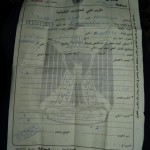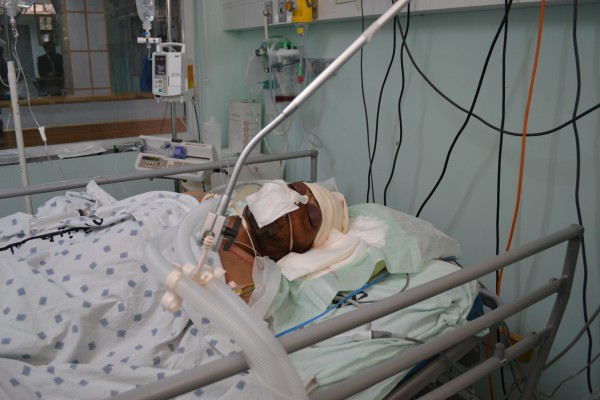from ISM webpage
13th May 2013 | International Action for Palestine | Gaza, Occupied Palestine
By Rosa Schiano
On May 1st many countries celebrate the achievement of workers on
Labor Day weekend. In Gaza too, workers celebrated labour day in a
demonstration in the centre of Gaza City. Yet, for the Palestinian
fishermen there was nothing to celebrate.

Hospital report (Photo by Rosa Schiano)
In the early hours of Wednesday morning on May 1st 2013, a
Palestinian fisherman was seriously injured when Israeli naval vessels
off the coast of Rafah, southern Gaza Strip, opened fire at Palestinian
fishing boats that were within 3 nautical miles of the Gaza coast.During
the attack, a piece of the engine that is used to pull in the nets,
smashed into the head of 51 year old Karim Adel Al Baker from Gaza City,
leaving him seriously injured.
Adel Najjar Baker was transported to the hospital and then to the
European Hospital in Khan Younis. We headed to the hospital to check on
his condition.Adel is in the Intensive care unit. A document in the
hospital room reads,“Time of admission: 5am”We spoke with Dr. Yasser
AlKhaldi, head of the Intensive Care Unit of the European hospital. Dr.
AlKhadi told us that Adel has suffered a serious head injury and that he
had arrived at the hospital unconscious.The doctor added that Adel has
undergone surgery to relieve the pressure from the bone fragments from
the skull and that he was now under artificial ventilation.
Adel has suffered a depressed skull fracture (a depressed skull fracture
is a break to the bone of the skull with depression caused by the bone
going into the brain).Dr. AlKhaldi added that there was an improvement
to the condition of Adel and they have started to reduce the sedatives.
During the visit we met Aatef Baker’s brother Adel. “Adel was on a
fishing boat together with eleven fishermen. While he was fishing, the
Israeli navy opened fire, a bullet hit an object on the boat, it fell on
his head, causing the trauma. We were near the border with Egypt, 2
miles from the coast. “, said Aatef.We left the hospital and took the
contacts of Dr. Adel AlKhaldi and family in order to be updated on his
condition.
I felt a sense of helplessness and anguish, but at the same time I
was hoping with all my might that Adel was strong enough to survive,
that he would be strong enough this time.

Karim Adel Al Baker, 51, in the hospital’s Intensive Care Unit (Photo by Rosa Schiano)
The next day we went to visit the family of Adel in the Shati refugee camp in Gaza City.
Adel has 7 daughters and 2 sons, one of whom is a fisherman. A cousin of
Adel, Mostafa Baker, told us that perhaps they would later evaluate the
possibility of a transfer to another hospital.
The house was full of women and children and they occasionally fixed their eyes on us.
“The entire family gathered here because we’re waiting for news. Adel’s brother is coming back from the hospital”, said Mostafa.
“The attacks and arrests affect our lives. With no fish we have no
money,” exclaimed a woman of the family Um Eid Baker, adding, “remember
when our fathers were able to reach 12 miles from the coast.”
Adel Baker worked for 30 years as a fisherman, and was the only person
in the family to have a job, his family has no other sources of income.
“This is the normally the best season for fishermen” said Mostafa, “the
major season for sardines.” The family then specified that the
fishermen, because of the limit of the 3 nautical miles from the coast,
are forced to go to Rafah in order to fish, and even enter Egyptian
waters, a move that involves great expense especially for fuel.
During our conversation, Aatef, the brother of Adel, returned from the hospital carrying the hospital report.
The hospital report specified that Baker and Adel was transferred from
Al Najjar to the European hospital, having suffered a head injury and
damage to the brain. It indicates the need for surgery and treatment. In
addition, the report specifies: “Al Aqsa conditions”, an expression
which is used to define someone injured or a victim of Israeli
aggression.
Then we met Sobeh El-Hessi, a fisherman who was on board the vessel along with Adel Baker, as well as the manager of the vessel.
“We were fishing the waters on the border between Egypt and Palestinian
waters. At 2 am the Israeli navy started shooting, we were about 2
nautical miles from the coast,” he began to tell Sobeh. “We tried to
hide from the bullets. Then when soldiers stopped shooting, we saw the
body of Adel Baker lying on the floor and we thought he’d been hit by a
bullet wound to the head. Then we realized that it was not a bullet, but
a heavy object that is part of the engine, and Adel had a large wound
to the head. I called the Union of the fishermen to communicate that
someone was wounded and asked for an ambulance. Adel A Hasaka was
carried to the beach and the ambulance was ready to take him to
hospital, it was about 3 in the morning, “, Sobeh told us.
The fishermen had entered Egyptian waters and were returning to Palestinian waters when the attack happened.
The next day the fishermen did not go fishing.
Sobeh told us also with concern about the recent Israeli attacks with
water cannons. The attacks are happening in fact even at a distance of
10 metres between the fishing vessels and the Israeli military.
Just over a year ago a fisherman was killed by a short circuit as a result of an Israeli attack with a water cannon.
The Israeli army directs their high pressure water cannons directly at
the power supply, they shoot at networks, the engine, thus causing
accidents. There is also the danger of electric shock or heavy machinery
collisions such that with Adel.
“Fishermen can see the fish beyond three miles, but can not pass through
them,” said Sobeh as he described the living conditions of the
fishermen of Gaza.
“When the Israeli soldiers shoot we escape, but we can not support our
families. These last few days have been tough. Prior to the war the
Israeli attacks occurred at a greater distance, but after the war the
Navy began to get very close and soldiers are shooting more than usual,
“says Sobeh.
The eyes of Sobeh el Hessi are sad, frightened, but also angry about what happened to Adel.
In Gaza, going fishing now means going to face an army.
As reported consistently by the Palestinian Center for Human Rights, the
Israeli attacks against Palestinian fishermen constitute a violation of
international humanitarian law. Notably this is covered in article 3 of
the Universal Declaration of Human Rights: that everyone has the right
to life, liberty and security of person. Not to mention the right to
work and the right to a life with dignity.
Indiscriminate attacks against civilians constitute war crimes.
Israel has progressively imposed restrictions on Palestinian fishermen’s
access to the sea. The 20 nautical miles established under the
agreements of Jericho in 1994 between Israel and the Palestine
Liberation Organization (PLO), were reduced to 12 miles under the
Bertini Agreement in 2002. In 2006, the area permitted for Palestinian
fishing was reduced to 6 nautical miles from the coast. Following the
Israeli military offensive “Cast Lead” (2008-2009) Israel imposed a
limit of 3 nautical miles from the coast, preventing the Palestinians
access to 85% of the water to which they are entitled according to the
agreements of Jericho 1994.
The agreements reached between Israel and the Palestinian resistance
after the Israeli military offensive in November 2012, “Pillar of
Defense,” allowed Gazan fishermen back out to 6 nautical miles from the
coast. Despite these agreements, the Israeli navy has not stopped
attacks on Gaza fishermen, even within this limit. In March 2013, Israel
imposed once again the 3 nautical mile limit, saying that the decision
had been taken following the sending of some Palestinian rockets towards
Israel.
In Gaza, there are currently about 4,000 registered fishermen, while in
2000 there were about 10,000. In the last ten years, the numbers have
declined since Israel began to impose restrictions on access to the sea
and used violence to enforce them, arrests and more attacks, forcing
fishermen to abandon their work and deny them the only source of
livelihood for their families. Many fishermen, with courage and
determination, continue to risk their life in order to support their
families.
At the time of writing, the conditions of Adel Baker have slightly
improved, but he is still unconscious in the ICU. While Adel Baker
fights on in the hospital, many fishermen are at sea facing the daily
risk of new attacks. It is inevitable, given this barbarity that another
one of them will soon be facing a similar fight just like Adel is right
now.
While the international community remains in horrible silence, our thoughts and our hearts are on the side of these brave men.



